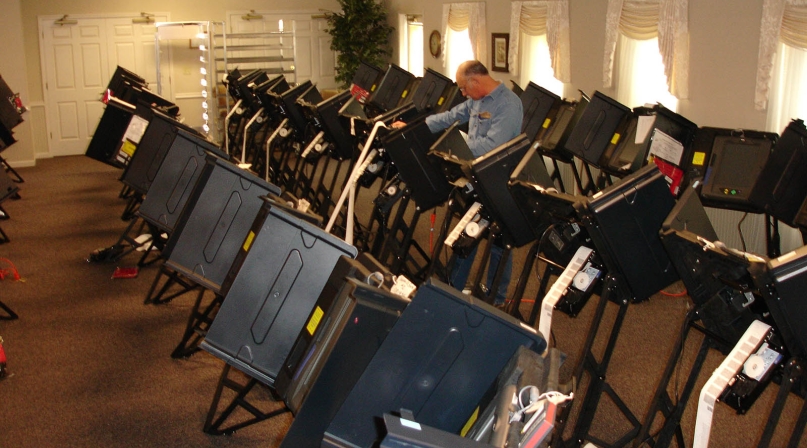State law on voting machines sticky for counties
Author
Upcoming Events
Related News

Key Takeaways
Some counties in North Carolina are scrambling to convert their current electronic voting machines to systems that use voter-verifiable paper ballots to comply with a state law.
In 2013, the North Carolina General Assembly passed an election reform law called the Voter Identification Verification Act (VIVA). The law requires that voting systems produce a paper ballot, which is defined as “an individual paper document that bears marks made by the voter by hand or through electronic means.” According to the law, “any direct record electronic (DRE) voting systems currently certified by the State Board of Elections which do not use paper ballots shall be decertified and shall not be used in any election.”
The law was originally planned to go into effect on Jan. 1, 2018, but the deadline was extended. The new date is Dec. 1, 2019.
Only voting machines certified by the North Carolina State Board of Elections can be used in elections.
According to Patrick Gannon, a spokesperson for the North Carolina State Board of Elections, the state currently has six different types of certified machines and tabulators. These machines were certified in the mid-2000s, he said. The state board is currently certifying three new voting machines that feature ballot-marking devices and produce voter-verifiable paper ballots.
“A BMD or ballot-marking device also has a touchscreen interface, but instead of recording your votes to memory, the machine prints your marked ballot for you to verify and then cast using the same kind of tabulator that can be used for hand-marked ballots,” Gannon said.
A total of 35 counties in the state are using electronic voting machines in some form for elections and will have to convert their systems to meet the requirements set by the new law. The current iVotronic voting machines are direct record electronic systems that allow voters to use touchscreens to make their selection and records votes directly onto memory hardware, Gannon said. These machines have a paper receipt trail that keeps track of votes, but does not produce voter-verifiable paper ballots.
A few counties throughout the state that are affected by the law are filing bills and resolutions to try to delay the decertification date of the DRE voting machines.
Charlie Collicutt, director of the Guilford County Board of Elections, said the decertification of the electronic voting machines poses a major challenge. State representatives filed a bill in the North Carolina House of Representatives that would change the decertification date of DRE voting machines in Guilford and Alamance counties.
Collicutt said the county has to make a decision to go with a paper ballot system and wait to see what types of equipment the state board certifies.
The new system will need to be tested in a real election, he said.
“We’ve got municipal [elections] coming out this year, but the turnaround time is really tight,” Collicutt said.
He added that another challenge is the state’s 2020 presidential primary, which has been moved to March from May, giving counties even less time to comply with the law. He emphasized that absentee-by-mail ballots need to be sent out in early January.
“It’s going to be a massive push over the holidays to get the poll workers ready for the new system,” he said.
Collicutt explained changing to a paper system will be a “total overhaul” of the system and will need to be done quickly.
“The administrative aspect of this is extremely, extremely difficult,” he said.
He estimates the switch to a paper ballot system could cost Guilford County as much as $8 million.
“We’re in the 11th hour and every day that goes by without a chance to look at new voting equipment, to look at new certified equipment, is going to make this more difficult,” Collicutt said. “We’re getting to a point where it’s not going to be fair to the voters to either be saddled with a system that maybe we don’t want or to not have a chance to fully vet some new and current and pretty neat technology that’s out there.”
Haywood County also uses DRE voting machines that have a verifiable paper trail, but not voter-verifiable ballots.
Haywood County commissioners requested a formal resolution for a postponement of the decertification date because the state is still completing the certification process of machines that will comply with the law.
Robert Inman, Haywood County’s director of elections, explained that changing to systems with paper ballots would be a dramatic shift for Haywood County. He said the conversion process is complicated and requires administrators to consider many different factors such as how to pick up paper supplies and where to store paper ballots.
“People look at it as a very simplistic thing and it’s truly not. It’s far more involved and has its challenges,” he said.
Inman estimates it will cost the county approximately $800,000 to switch to machines with paper ballots.
Mecklenberg County, one of the largest counties in North Carolina, will also need to make changes to the county’s electronic voting equipment.
“It would be very hard for me to roll out new equipment for an election in March,” said Kristin Mavromatis, Mecklenberg County’s Public Information manager for the Board of Elections.
Although the State Board of Elections says there are six types of machines currently certified in the state, Mavromatis said the technology of these certified machines is antiquated. She added that counties are unable to buy these certified machines in new condition and would have to purchase them used.
“If you’re going to spend money, you don’t want to buy used. You want to buy new,” she said.
Because the State Board of Elections has not recently certified any machines, Mavromatis said the county would be stuck with purchasing the outdated voting equipment. If the state does not certify any machines between now and the decertification date, the county plans to rent machines, she said.
“It seems ridiculous to get rid of something just fine to rent something that is so antiquated,” she said.
Additionally, Mavromatis said the county “loves” the electronic voting machines and has used a form of DRE machines for the last 30 to 35 years.
She said once the state board does certify new machines, the county needs time to decide which equipment they want to purchase.
“We would love to see an extension. I’m happy to go with paper. I want to do it the right way. I’d like to be able to see my options. I’d like my county to be able to make arrangements,” she said. Davidson County also passed a resolution to delay the decertification until 2022.
A North Carolina state bill was filed April 16 to delay the decertification date of DRE voting machines. The new decertification date would be Dec. 1, 2021, and apply statewide.

Attachments
Related News

Pa. counties consider furloughs, loans as state budget lapse continues
For the third time since 2015, an unresolved state budget dispute that has dragged on for several months has left counties without the revenue that they depend on to provide critical services.

County library cooks up interest with chef series
Orange County, Calif.'s library system drew in new patrons by introducing its offerings through a cooking video series.

County repurposes airport’s lost and found items for animal shelter
Broward County, Fla. staff made use out of items left behind at the county airport.
